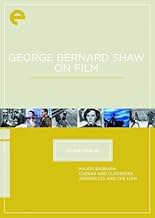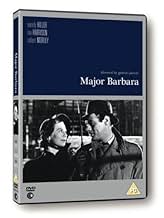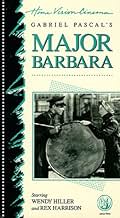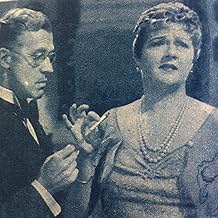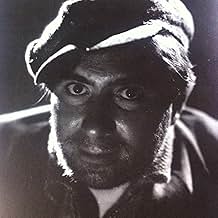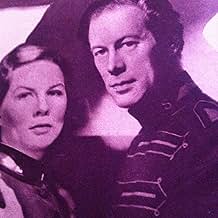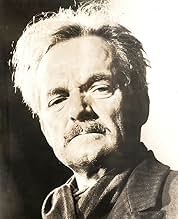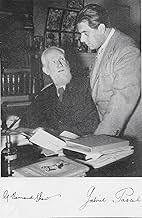Major Barbara
- 1941
- Tous publics
- 2h 11m
A young and idealistic woman, who has adopted the Salvation Army and whose father is an armament industrialist, will save more souls directing her father's business.A young and idealistic woman, who has adopted the Salvation Army and whose father is an armament industrialist, will save more souls directing her father's business.A young and idealistic woman, who has adopted the Salvation Army and whose father is an armament industrialist, will save more souls directing her father's business.
- Awards
- 1 win & 1 nomination total
Featured reviews
No one yet has mentioned the cinematography. I'm no student on this topic, but the scenes where Undershaft gives a tour of his factory and his vision of paradise are truly awe inspiring. There's nothing subtle in it, it is quite vivid for its time. And I think black & white is perfect here. If it were done today in color, I'm sure it would lose something. As someone else said they're not sure why the movie is a comedy. Intentional (as a comedy) or not, t could be this scene.
I haven't seen the movie in years, it is this one scene that lives on in memory above all others.
Although Major Barbara (Windy Hiller) is the title character, the real center of the story is her father, munitions tycoon Andrew Undershaft, played brilliantly by a fairly young, and uncharacteristically lean, Robert Morely. It is he who really moves the progress of the story, just as he has controlled the courses of the lives of his family in absentia for the past twenty years without their even being aware of it. As Barbara smugly repudiates his attempts to contribute his tainted money to save her Salvation Army mission, he ironically reminds her fiancée (and the audience) that she has actually accepted a great deal of it already. In fact, she has been living off his tainted money all her life. Tricked out with a Mephistophelean beard (he is constantly referred to as the "Prince of Darkness, and even his name seems redolent of Hell), Undershaft tempts his daughter and prospective son-in-law to abrogate their life in the Salvation Army for his life in the munitions business.
Undershaft proposes to spend a day in Barbara's Salvation Army mission if she'll agree to spend a day at his munitions works. She agrees because, in her religious zeal, she's convinced she can convert her father. The worldly Undershaft, on the other hand, is equally sure that he can wean his daughter away from a life he perceives as a waste of her time and talent for one where he feels she can really make a difference.
Whether viewers perceive Shaw's story as cynical or realistic depends upon their point of view. Clearly Shaw took the latter view, at least at the time he wrote "Major Barbara". However, perhaps the most remarkable thing about "Major Barbara" is that a film like this should have been produced in Britain at all during the very darkest days of World War II. It is almost impossible to imagine a film such as this being produced in Hollywood at all, let alone during wartime!
Film adaptations of his plays are a mixed bag, to put it mildly and some are too risible to mention. The greatest is indisputably the 'Pygmalion' of Anthony Asquith. The superlative editing on that film is courtesy of David Lean who fulfils that role once more in 'Major Barbara' and also acts as assistant director to Gabriel Pascal. How much influence Lean and fellow assistant Harold French had on the film is unknown but one thing is certain: Pascal is no Asquith!
The title character is another of Shaw's strong females and she is played by Wendy Hiller who had already excelled as Eliza Doolittle. To portray a character who is intensely 'moral' without being self-righteous is no easy task and Miss Hiller manages to pull it off. Rex Harrison is Cusins, her devoted admirer, who is based on classical scholar/humanist Gilbert Murray. This part marks the start of Harrison's long association with the works of Shaw culminating in his Tony Award in 1984 as Captain Shotover in 'Heartbreak House'.
David Tree had beautifully played Freddie in 1938 as a harmless twit and does so again here as Cholly Lomax. Marie Lohr is suitably imperious as Lady Britomart. This is not exactly Emlyn Williams' finest hour and his Cockney accent is atrocious. His portrayal epitomises the film's rather patronising attitude towards the 'lower orders' whilst Robert Newton is simply stupendous as malcontent Bill Walker and little wonder that Lean would later cast him as Bill Sykes.
In Shaw's plays there is invariably a Shavian 'realist', some might say 'cynic', whose voice is that of Shaw himself and whose function it is to utter incisive and unpalatable truths about the human condition. In this we have the fascinating Andrew Undershaft, known affectionately as the 'Prince of Darkness'. He is a self-made man who has made his millions as a munitions manufacturer and who regards 'poverty' as the greatest of all crimes. Although a little too young for the part he is played superbly by Robert Morley. One of his best scenes is with his son Stephen, played by Walter Hudd, who was in fact eleven years older than Morley. He advises him that as a man who knows nothing but who thinks he knows everything, a career in Politics beckons!
The play also takes a swipe at religion, which didn't exactly increase its popularity in the United States.
Undershaft declares that 'being a millionaire is my religion' and Barbara herself realises that she must pursue her religious aims through the capitalists 'whose hands stretch everywhere'.
Shaw was born in 1856 and it is marvellous to think that he was still around in 1941 to 'collaborate' on the script.
Lean's editing is again exemplary and the production design of Vincent Korda, especially that of Undershaft's 'Death Factory', is magnificent.
Fine score by one of our greatest composers, William Walton.
Although this film misses the Asquith touch it is, all-in-all, a very satisfactory version of Shaw's morality tale in which it is not the love of money but the lack of it that is the root of all evil. The happy Hollywood-style ending is not exactly what the playwright had in mind but is obviously there so as to send wartime audiences out of the cinema wearing a smile.
Shaw the comic dramatist is always a treat. Shaw the self-created man with all the answers is another problem. "Major Barbara" is a look at how money is made by ways that are spiritually appalling (armaments and booze for example), but which guarantee jobs and hope to people who can't get them from the world of religion. One probably can agree with this point of view, but the constant pushing of Undershaft's point of view - nobody ever trounces him in an argument - is annoying. He seems omnipotent in this play (as Shaw, no doubt, wanted him to be). I once suggested that it would have been delightful if after one of his speeches he had actually had coughed blood (to show he was mortal). But Shaw never would have done that to St. Andrew.
Yet he did do something within a decade after writing "Major Barbara" that was inconsistent. Shaw probably never willingly discussed it with anyone. Undershaft rules his armaments firm with a total control. He dictates to the government on policies he needs. The stockholders don't seem to exist. But in 1916 Shaw's optimism about dictatorial capitalists had faded. World War I shattered him a bit, and he wrote "Heartbreak House". In it is the character of "Boss Mangam", a powerful business tycoon like Undershaft, who proves to have feet of clay. It seems the great tycoon has to satisfy those stockholders or his empire is taken from him. The same, of course, has to be true of "St. Andrew" Undershaft as well. He probably is his largest shareholder, but he never says he is sole shareholder. Undershaft was quite content and pontifical in 1907 when he describes his religion of cannons and prosperity for all who listen to him. But that was peacetime. Somehow, in 1916, "St. Andrew" would probably have found it harder to be as glib about his doctrines as he had been.
Did you know
- TriviaFilming went on through the German Blitz. Producer and Director Gabriel Pascal had his own spotter on the roof who blew a horn when he spied German planes. According to Ronald Neame, nobody had told Wendy Hiller, so when the horn sounded during a rehearsal and everybody left, Hiller was bewildered.
- Goofs(at around 1h 35 mins) Just before she scolds her husband for addressing her as "Biddy", a boom mic shadow passes over the lace trim on the bosom of Lady Britomart's (Marie Lohr) gown.
- Quotes
Andrew Underschaft: [to son, Stephen] Well, is there anything you know or care for?
Stephen Underschaft: I know the difference between right and wrong.
Andrew Underschaft: You don't say so! What? No capacity for business? No knowledge of law? No sympathy with art? No pretention to philosophy? Only a simple knowledge of the secret that has baffled all the lawyers, muddled all the men of business, and ruined most of the artists - secret of right and wrong. Why man, you're a genius. A master of masters. A god. And at 28, too.
- Alternate versionsA long final speech by Undershaft (Robert Morley) was filmed but cut before release. The National Film Theatre showed this version many years ago. The British Film Institute lists a print running 136 minutes - some 15 minutes longer than the released version - which presumably is that version.
- ConnectionsFeatured in Discovering Film: Rex Harrison (2015)
- SoundtracksHow Sweet the Name of Jesus Sounds
(uncredited)
Music by Alexander Reinagle (1836)
Words by John Newton (1779)
Arranged by William Walton
- How long is Major Barbara?Powered by Alexa
Details
- Release date
- Country of origin
- Language
- Also known as
- George Bernard Shaw's Major Barbara
- Filming locations
- Royal Albert Hall, South Kensington, London, England, UK(Salvation Army rally scene)
- Production company
- See more company credits at IMDbPro
- Runtime
- 2h 11m(131 min)
- Color
- Aspect ratio
- 1.37 : 1

